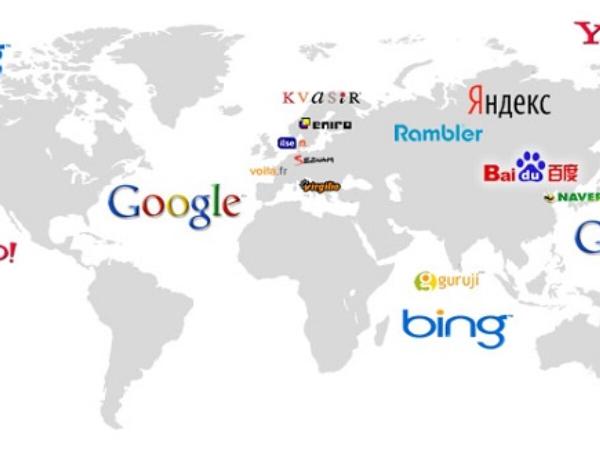Top 10 World Famous Search Engines: Navigating the Digital Landscape

Strong 8k brings an ultra-HD IPTV experience to your living room and your pocket.
In the vast expanse of the internet, search engines serve as the gateway to information. Whether you're seeking answers to burning questions, exploring new interests, or conducting research, search engines are indispensable tools that streamline our online experience. Over the years, numerous search engines have emerged, each offering unique features and functionalities tailored to meet diverse user needs. In this article, we'll delve into the top 10 world-famous search engines, examining their evolution, key features, and impact on the digital landscape.
Google:
Google reigns supreme in the realm of search engines, positioning itself as a star performer in the BCG Matrix. Founded in 1998 by Larry Page and Sergey Brin, Google revolutionised the way we access information online. With its powerful algorithms and vast index of web pages, Google delivers highly relevant search results at lightning speed. From its humble beginnings as a research project at Stanford University to its current status as a tech giant, Google continues to dominate the search engine market with innovations like Google Maps, Google Images, and voice search capabilities through Google Assistant.
Bing:
Microsoft's Bing search engine may not boast the same market share as Google, but it has carved out its niche in the search engine landscape. Launched in 2009, Bing distinguishes itself with visually appealing homepage backgrounds and a focus on multimedia-rich search results. Moreover, Bing powers the search functionality for Microsoft's Cortana virtual assistant and integrates seamlessly with Microsoft Edge browser, offering users a cohesive digital ecosystem.
Yahoo:
Once a dominant force in the early days of the internet, Yahoo still maintains a presence in the search engine arena. While its market share has dwindled over the years, Yahoo remains a popular choice for email, news, and other web services. Yahoo's search engine provides a familiar interface and aggregates content from various sources, including news articles, images, and videos, catering to users seeking diverse information.
Baidu:
Often referred to as the "Google of China," Baidu is the leading search engine in the world's most populous country. Founded in 2000 by Robin Li, Baidu offers a wide range of services beyond traditional search, including maps, online encyclopedia, and cloud storage. Baidu's dominance in the Chinese market stems from its deep understanding of the local language and culture, as well as its focus on providing relevant search results tailored to Chinese users.
Yandex:
Hailing from Russia, Yandex is the preferred search engine for Russian-speaking users. Established in 1997, Yandex has evolved into a comprehensive internet company offering search, email, maps, and other services. What sets Yandex apart is its advanced language processing capabilities, allowing it to understand complex queries in Russian and other languages spoken in the region. Moreover, Yandex's integration with Russian social networks and local businesses enhances its relevance to Russian users.
DuckDuckGo:
In an era of growing concerns over online privacy, DuckDuckGo has emerged as a beacon of anonymity. Founded in 2008, DuckDuckGo prioritizes user privacy by not tracking or storing personal information. While its search results may not be as comprehensive as those of its competitors, DuckDuckGo appeals to users who value privacy and seek an alternative to data-hungry search engines.
Ask.com:
Formerly known as Ask Jeeves, Ask.com adopts a question-and-answer format, allowing users to pose queries in natural language. Founded in 1996, Ask.com aims to provide concise answers to users' questions rather than inundating them with search results. Although its popularity has waned in recent years, Ask.com remains a viable option for users seeking straightforward answers to specific queries.
AOL Search:
America Online (AOL) may no longer be the internet powerhouse it once was, but its search engine still attracts a loyal user base. AOL Search offers a simple yet effective search experience, complemented by features like news aggregation and email services. While its market share may pale in comparison to industry giants like Google, AOL Search continues to serve as a reliable option for users within the AOL ecosystem.
Ecosia:
For environmentally conscious users, Ecosia offers a unique proposition – planting trees with every search. Founded in 2009, Ecosia uses the revenue generated from search ads to fund tree-planting projects around the world. By harnessing the power of online search for environmental conservation, Ecosia appeals to users looking to make a positive impact while browsing the web.
Startpage:
Similar to DuckDuckGo, Startpage prioritises user privacy by offering anonymous search capabilities. Founded in 2006, Startpage retrieves search results from Google without tracking users' personal information or search history. With a focus on privacy and security, Startpage provides peace of mind to users concerned about their online footprint.
Conclusion
Search engines play a pivotal role in shaping our online experiences, facilitating access to information and services with just a few keystrokes. From industry giants like Google and Bing to privacy-focused alternatives like DuckDuckGo and Startpage, the diverse array of search engines caters to a wide range of user preferences and priorities. As technology continues to evolve, we can expect search engines to adapt and innovate, further enhancing our ability to navigate the vast digital landscape.
Note: IndiBlogHub features both user-submitted and editorial content. We do not verify third-party contributions. Read our Disclaimer and Privacy Policyfor details.


